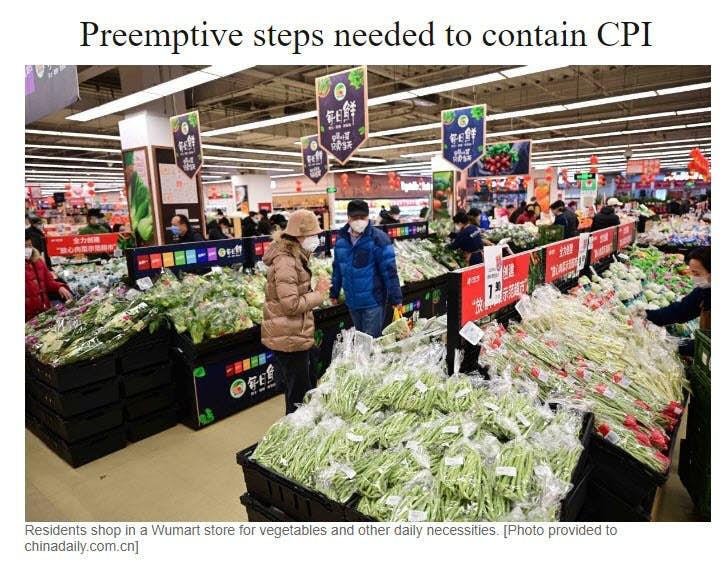中国は金利のジレンマに直面している、答えは無い。
Michael Pettis at China Financial Markets has an interesting chain of Tweets on China's unsolvable interest rate mess.
北京大学金融学教授Michael Pettisが興味深い一連のtweetを発している、中国の混乱する金利政策は解決不可能だというものだ。
Preemptive Steps Needed to Contain CPI
CPIを抑え込むための先制政策が必要だった

中国日報はCPIを抑え込むための先制政策が必要だと伝える
China's consumer price index (CPI), the main gauge of inflation, grew 5.2 percent year-on-year in February, the National Bureau of Statistics said on Tuesday. The growth, in line with market expectations, was slightly lower than 5.4 percent in January. On a monthly basis, consumer prices edged up 0.8 percent.中国の消費者物価指数CPI、インフレ指標だが、これが2月にYoYで5.2%と大きくなった、と国家統計局が火曜に報告した。この増加は市場予想どおりで、1月の5.4%よりは少し低いものだ。月次ベースでは消費者物価は0.8%上昇している。
Food prices, which account for nearly one-third of weighting in China's CPI, went up 21.9 percent year-on-year in February, contributing 4.45 percentage points to the rise in the index as the novel coronavirus outbreak disrupted market supplies and demands.中国のCPIの1/3は食料品によるものだ、これが2月にYoYで21.9%上昇した、武漢コロナのために指数を4.45%押し上げている、市場の需給を破壊したためだ。
That the CPI has been above 5 percent for two consecutive months has raised fears that China could face high inflation in the long run, which could have a negative impact on people's livelihoods that have already been affected by the novel coronavirus epidemic.
2か月連続でCPIが5%を超えたことで長期的に中国は高インフレに突入するのではないかという懸念が持ち上がった、これはすでに武漢コロナ流行で打撃を受けている人民の生活にマイナスインパクトを与えかねない。
Bank of China Faces a Real Dilemma with Interest Rates
BoCは金利政策におけるジレンマに直面している
混乱の最中に金利を引き上げるのは論外だ。先制的政策の取りようがない。
CPI Inflation is at 5% but bank interest rates are only 1.5%.
CPIインフレは5%にもなるのに銀行金利はわずか1.5%でしかない。
Food production has collapsed, but lower interest rates to stimulate will stimulate the wrong things while hurting consumer savings.
食糧生産は崩壊しているなかで、低金利政策で刺激策を取るのはまずい、預金を痛めてしまう。
Lower spreads will hurt bank profits and the Chinese banking system is a basket of nonperforming SOE loans.
長短金利差がさらに低下すると銀行収益を悪化させる、中国の銀行システムは国有企業の不良債権で溢れかえっているのだ。
Pettis Tweet Thread on China's Dilemma
中国のディレンマに関するPettisの一連のTweet
-
It seems to me that the PBoC faces a real dilemma with interest rates.
Thanks to still-soaring food costs CPI inflation in February remained
above 5%, well above the deposit rate, with 1-year deposits at 1.50% and
average deposits much lower. This means...
PBoCは金利政策に関して本当にジレンマに陥っているように見える。2月のCPIインフレは5%を超えており、預金金利よりも遥かに大きい、一年もの定期預金でも1.50%であり、平均金利はもっと低い。これの意味するところは・・・・
-
...that the value of household savings is being eroded by
rising food costs, and this effectively represents a wealth transfer
away from households, with poorer households being hit harder
(both because of limited savings opportunities and because food is a
larger share of...
・・・食料品価格高騰で家計貯蓄の価値は劣化している、そして実行的に家計から資産を奪い取っている、貧困層はより打撃を受ける(もともと預金が十分でない上に消費の大部分が食料品だ)
-
...their consumption basket). This is exactly the opposite of what Beijing needs
if it is to reduce its over-reliance on spurious investment to generate
growth. If households have to increase their savings rate in order to
make up for the inflation tax, they must spend less...
この状況は、北京政府の意図するものとは全く逆の状況になっている、北京政府は見せかけの投資による成長依存度を下げようとしている。もしインフレ税に立ち向かうために家計が預金を増やそうとするなら、消費を減らさざるを得ない、
-
...on consumption, in which case China needs more
investment to generate the same amount of growth. This is why the PBoC
doesn’t want to lower the deposit rate. But it cannot raise rates
either. Unlike in 2000-11, when banks and corporate/government borrowers
were the huge...
こうなると成長を維持するために中国政府はさらなる投資が必要になる。だからこそPBoCは預金金利を下げたくない。しかし金利を引き上げることもできない。2000−11とは異なり、当時は銀行や企業/政府の借金は巨額で・・・・
-
...beneficiaries from extremely negative real interest rates, they
aren’t this time around. With negative PPI inflation, and a 1-year loan
prime rate of 4.05%, manufacturers may in fact be borrowing at very high
real rates, especially given that all the inflation is showing...
・・・実行金利が極端なマイナスの方が恩恵は大きかった、今回は状況が異なる。マイナスPPIインフレともなると、1年ものプライムレートローンは4.05%であり、製造業者は実際とても高い実質金利で借金をしている、特に高インフレ状況が食料品に現れている、
-
...up in food prices, whereas the prices of the manufactured goods
they produce are stable or even trending down. This probably just means
that last year’s collapse in meat production – which is the main source of CPI inflation – is being paid for in part by households, in...
一方で製造業の出荷価格は横ばいか下落気味だ。この状況は昨年の食肉供給崩壊から多分生じているーーこれがCPIインフレの主要因だーー家計はこれを負担している、
-
...the form of an erosion in the value of their savings, in part by
businesses, in the form of high real borrowing costs, and of course in
part by farmers. This makes it very difficult for the PBoC either to raise lending rates or lower deposit rates, and of course it can’t...
これが家計の貯蓄を毀損している、ビジネスの一部でもそうだ、借金コストが増えている、そして当然ながら農家も苦しんでいる。この状況ではPBoCは貸出金利を上げるのも預金金利を下げるのもとても難しい、当然長短金利差を小さくするのも難しい、・・
-
...narrow the spread because that would effectively force already-undercapitalized banks to absorb the cost. Once
food prices drop we might see a very sharp reversal of wealth transfers
from the household sector, but until then the PBoC doesn’t have much
space for maneuver.
というのもすでに自己資本不足の銀行にコスト吸収の余地はないのだ。一旦食料品価格が下落すると家計からの資産移動が急反転するのを目の当たりにするかもしれない、しかしそうなるまでPBoCは政策余地が無い。
Tweet読みたければ、その先頭Tweetがここにある。
Inflation or Deflation?
インフレかデフレか ?
Twitterの議論テーマはこれだ。多くの人はインフレになると見ているが、私の見解は異なる。
The collapse in demand will take care of shortages except for critical things like food.
需要崩壊が生じているわけで、食料のような必須項目以外では物資不足にはならないだろう。
China has a unique problem. Low food production and a soaring CPI in response.
Unless there is a food production problem in the US, the Fed will not face the same dilemma.
中国固有の問題がある。低い食料生産と急騰するCPIだ。米国のように食料品生産で問題がない場合、FEDは同じようなディレンマに直面しないだろう。
Exporters Hit Hardest
輸出業者が打撃を受ける
グローバル輸出パワーハウスはこの環境で大打撃を受けるだろう。
China and Germany are at the top of the list.
その先頭が中国とドイツだ。
Deflationary US Outcome
米国はデフレに
私は、大きなデフレが始まると信じている。
Prepare for another round of debt deflation, possibly accompanied by a lower CPI especially if one accurately includes home prices instead of rents in the CPI calculation.
次の債務デフレに備えよ、たぶんにCPI低下を伴う、特に住宅価格に注意だ、CPI計算時の帰属家賃ではない。
Central banks’ seriously misguided attempts to defeat routine consumer price deflation is what fuels the destructive asset bubbles that eventually collapse
I am not blaming the Fed for the coronavirus and these shocks.
各国中央銀行は常に大きく間違って消費者物価デフレを打ち負かそうとしている、結果として破滅的な資産バブルを引き起こしこれがやがて崩壊する。私は武漢ウイルスに対するFEDの対応を責めては居ない。
However, I am blaming the Fed for its erroneous inflationary tactics that blew three of the biggest economic bubble in succession: 2000, 2007, 2020.
しかしながら、私は過去3度連続の間違ったFEDのインフレ戦略を責めている、三度連続して経済バブルを引き起こした:2000,2007,2020。
Bubbles are inherently deflationary. It’s asset asset bubble deflation that is damaging, not routine price deflation
バブルというのはおのずからデフレ的なものだ。ダメッジを引き起こすのは資産バブルデフレだ、物価デフレではない。
“Deflation may actually boost output. Lower prices increase real incomes and wealth. And they may also make export goods more competitive,” stated a BIS study.
「デフレになると実際生産を増やす。低価格が実収入と資産を増やす。輸出品の競争力を増すのだ、」これはBISの研究によるものだ。
For a discussion of the BIS deflation study, please see Historical Perspective on CPI Deflations: How Damaging are They?
BISのデフレ研究については、この論文を読むが良い、CPIデフレに関する歴史的研究:それでどれだけダメッジを生じたか?
A Supply Shock and a Demand Shock are Coming Up.
武漢コロナで供給ショックと需要ショックが待ち構えている。
Supply Shock and a Demand Shock Coming Up
供給ショックと需要ショックが待ち構えている
武漢コロナで供給ショックと需要ショックが待ち構えている。
Worth Repeating
繰り返しになるが
金利低下を見ているのは私だけではない。Well - Not Me
I have been calling for lower and lower yields
多くの人は債務デフレを理解していない
People do not understand debt deflation
Deflation is not really about prices. It's about the value of
debt on the books of banks that cannot be paid back by zombie
corporations and individuals.
デフレは単に物価を指すわけではない。銀行の帳簿の債務価値を指すのだ、ゾンビ企業も家計ももはや返済不能になっている。
The ISM says 75% of Companies Suffer From Coronavirus Supply Chain Disruptions
ISMは企業の75%が武漢コロナのサプライチェーン崩壊に苦しんでいるという。
Don't expect inflation out of this except in medical supplies and related items.
医薬品関連以外に今回の出来事でインフレを期待しないことだ。
デフレは単に物価を指すわけではない。銀行の帳簿の債務価値を指すのだ、ゾンビ企業も家計ももはや返済不能になっている。
75% of Companies Suffer From Coronavirus Supply Chain Disruptions
75%の企業が武漢コロナによるサプライチェーン崩壊に苦しんでいる。
ISMは企業の75%が武漢コロナのサプライチェーン崩壊に苦しんでいるという。
Don't expect inflation out of this except in medical supplies and related items.
医薬品関連以外に今回の出来事でインフレを期待しないことだ。
Q. Why?Q。どうしてか?
A: The demand shock over stock market decline and lost wages has not been felt yet. It soon will.A: 株価下落で需要ショックが起き、まだ給与減退が表面化していない。でもそれがすぐにやってくる。



